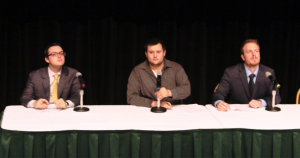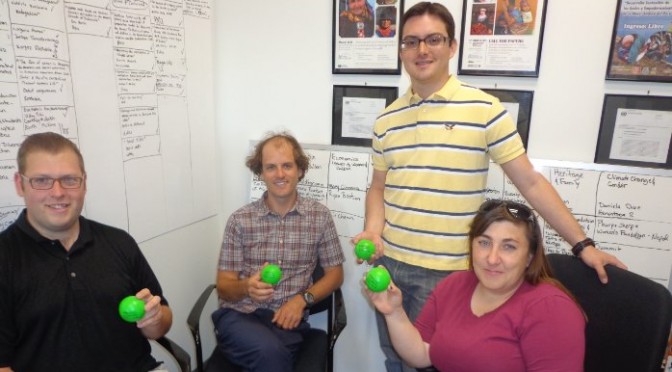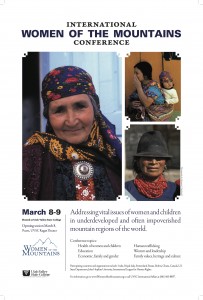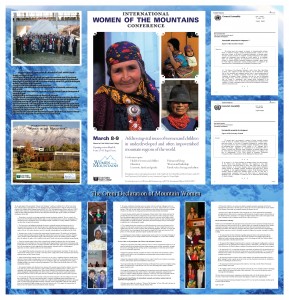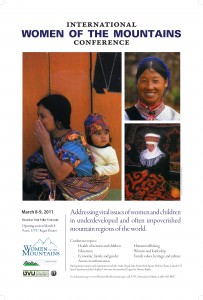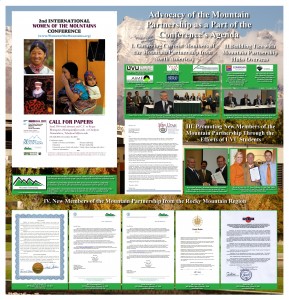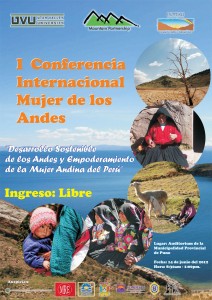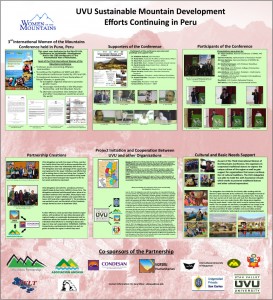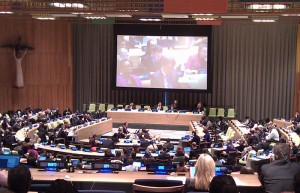As students at Utah Valley University (UVU) approaching graduation, we really found ourselves wanting to get more involved professionally and practically, so to speak. We were looking for a cause to get involved with outside the classroom that would give us not only an experience, but would also allow us to distinguish ourselves in today’s competitive markets. Fortunately, we were able to find this opportunity in the (WOMC) as members of the secretariat of the conference. WOMC was sponsored by number of international institutions including the United Nations Mountain Partnership and it took place at the UVU campus located in Orem, Utah on October 7-9, 2015.
The WOMC was a true model of student engaged learning. As you may or may not know, this year’s conference was facilitated by students; members of the Utah International Mountain Forum (UIMF), a coalition of student clubs at UVU. It was truly awesome to watch the conference unfold, seeing the incredible things that students are capable of, and to be able to be a part of it. Our faculty, and many other prominent scholars and experts throughout mountain communities, served as advisers guiding us students through the complex process; from raising funds to sending invitations and calls for papers, taking care of accommodation for participants, and many other things. While much effort went into the preparation and execution of the conference, it wasn’t until its successful end that the greater part of our work in the conference really began.
Our job as members of the Secretariat was to draft the final document of the, compiling thoughts and ideas from the conference participants, including recommendations to the international community on gender issues. In August 2015, Deann Torsak, executive secretary of the conference, distributed the various responsibilities among the members of the Secretariat. Initially four students signed up to work on the final document of the WOMC. However, by the end of the conference only two of us from original group remained committed to do that very important job. We accomplished our task under the guidance of our advisers Dr. Butler, Associate VP for International Affairs and Diplomacy and focal point for the Mountain Partnership at UVU and Dr. Baktybek Abdrisaev, faculty in the History and Political Science Department at UVU and advisor of UIMF. We were extremely impressed and inspired by every participant’s level of dedication.
Our responsibilities included many activities important for the success of the conference and for our further professional growth, such as: analyzing similar documents, methodologies, and procedures adopted by other international forums. To achieve a high level of professionalism in our task required us to study additional academic literature, and the United Nations official documents, on different topics of gender and sustainable mountain development agendas. It was important for us also to utilize previous experiences accumulated by our predecessors during the adoption of this document. For example, we drew from the and the final document of the in Utah, which was gathered in March 8-9, 2007.
(L to R): Jesler Molina, outgoing President of UIMF, Rex Linder, and Seth Gordon during the session to discuss the draft of the final document of the WOMC
Drafting the document began by gathering the submitted papers of conference participants and recruiting recommendations and suggestions from them on their expectations of the final document. To ensure maximum accuracy and efficiency, our team divided the different panels between each of our members and studied the information collected before collaborating to prepare the initial draft of the document before the conference had begun. During the conference, each team member was assigned different sessions to attend, in order to make certain that all of the additional thoughts and ideas outlined by presenters would be incorporated into the developing draft of the document. As a result, we distributed and presented the first rough draft of the final document to all conference participants in a plenary session at the end of the conference activities on October 8, 2015.
For the month or so that followed the conference, we worked very diligently compiling notes and developing the various drafts of the document. In all, we sent out variants of the document to every conference participants three times. Each time the participant were given approximately one week to study it and to make suggestions concerning necessary changes to the: language used, to add new ideas, and recommendations, etc. We are so grateful to the many conference participants who actively corresponded with us regarding the document’s content and offered helpful and important suggestions. Mia Rowan, from the Mountain Partnership Secretariat, and Dr. Jed Shilling, from the Mountain Institute, were among our major contributors; and from whom we learned how to work on an official document of this caliber. It took close to a month and a half before the final version of the document was adopted by conference participants. That moment was the day of the approval of the document, which was the December 1, 2015. The final document was submitted to the Mountain Partnership Secretariat for further use and distribution among all interested stakeholders around the world. The Final Document is available at the WOMC 2015 web-site:
As students of UVU’s College of Humanities and Social Sciences (Seth-Philosophy and Rex-Political Science), we found that our education had definitely provided us with the necessary tools and prepared us for such a task. It was an amazing experience being in correspondence with the various participants in the conference, receiving suggestions and constructive criticism in order to accurately portray all of the presenter’s work and the overarching, critical messages of the conference. Our involvement in this conference provided us with invaluable real world experience and skills which include knowledge of bureaucratic processes, working in a team setting, and drafting a professional document, to name a few. We are glad that we were able to finish the job we started, seeing it through to its successful end. We are very proud of the level of quality we were able to achieve in this document, which was quite a challenging task for us; requiring a lot of time and dedication, while still juggling our regular school assignments and work responsibilities. The skills we gained here will undoubtedly assist us in our future endeavors.
We thank everyone that participated and contributed to the success of the conference.
Seth Gordon and Rex Linder, members of the 2015 WOMC Secretariat
